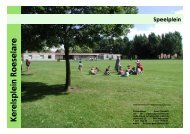Housing First - Provincie West-Vlaanderen
Housing First - Provincie West-Vlaanderen
Housing First - Provincie West-Vlaanderen
Create successful ePaper yourself
Turn your PDF publications into a flip-book with our unique Google optimized e-Paper software.
<strong>Housing</strong> <strong>First</strong>is scattered throughout a municipality, city orregion, sometimes it is concentrated in specificapartment blocks. HFL services provide access tohousing in several ways〉〉An HFL service might be provided directlyby a social housing provider and use its ownsocial housing stock.〉〉An HFL service may function independentlyand work in cooperation with social housingproviders and private rented housing providersto provide homeless people with housing.〉〉An HFL service may not have direct access toany housing, instead it will provide support toa homeless person or household so that theyare able to access private rented or socialhousing.❱❱<strong>Housing</strong> is separated from support, meaningthat access to housing and security of tenure isnot linked to whether or not a homeless personaccepts the support services that are offered,including mental health and drug and alcoholservices.❱❱There is no requirement for abstinence fromdrug and alcohol use.❱❱HFL services use a service brokerage model, i.e.support workers enable access to mainstreamhealth and welfare services for homeless people,ensuring they receive all the support they areentitled to. Support workers might also arrangeaccess to specialist services, such as drug andalcohol detoxification or psychiatric services 106 .HFL services might also facilitate access toeducation, work-related and employment relatedservices, as well as services designed to promotesocial inclusion.❱❱HFL services use low intensity support, centringon service brokerage and on limited supportwith housing-related needs. Alongside arrangingaccess to welfare and health services, an HFLworker might also provide advice and assistancewith dealing with electricity bills, ensuring therent is paid and ensuring a homeless personis eating healthily. A worker might only see ahomeless person using an HFL service oncea week, or less, and HFL services are oftendesigned to gradually withdraw support as ahomeless person becomes better equipped tolive independently.❱❱An HFL service can be used for homeless peoplewith a range of support needs. This meansthat an HFL service may support chronicallyhomeless people but that it may also supporthomeless people with lower levels of supportneed.❱❱An HFL service can be focused partially orlargely on homelessness prevention, suchas some UK ‘tenancy sustainment services’,targeting people who have been identified as atrisk of homelessness who have not actually everbeen homeless.Services following this basic model operate in anumber of EU member states 107 . However, theextent of these services is difficult to map because,with the exception of France, 108 , and a few othercountries, databases of homelessness services areoften not available at the national level. As noted,services of the HFL type are the most commonform of homelessness service provided in the UK 109 ,but these services are less common than staircaseservices in the USA and may be less common thanCHF services 110 .106 Goldfinger, S. M., R. K. Schutt, et al (1999) ‘<strong>Housing</strong> placement and subsequent days homeless among formerly homelessadults with mental illness’ Psychiatric Services 50, 5 pp. 674-9; Hickert, A.O. and Taylor, M.J. (2011) ‘Supportive <strong>Housing</strong>for Addicted, Incarcerated Homeless Adults’ Journal of Social Service Research 37, pp. 136-151.107 Busch-Geertsema, V. (2005). «Does re-housing lead to reintegration? Follow-up studies of re-housed homeless people.»Innovation 18, 2, pp. 202-226.108 Marpsat, M. (2007) 149 Documents de travail Services for the Homeless in France: Description, official statistics, clientrecording of information INED109 Centre for <strong>Housing</strong> Research (2010) Supporting People Client Records and Outcomes: Annual Report 2009-2010 (StAndrews: University of St Andrews).110 Tabol, C. et al (2009) op cit.33
















